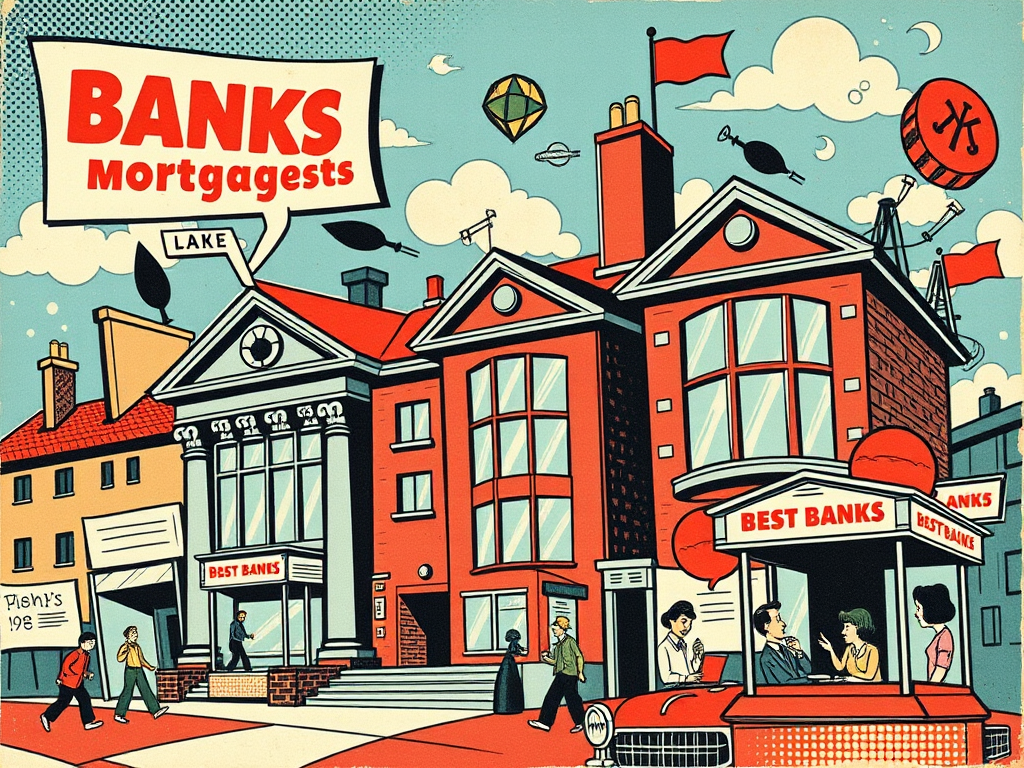
Mortgage Market Revival: Greek Banks Lending Again and Property Impacts
Reading time: 15 minutes
Table of Contents
- Introduction
- Historical Context: Greek Financial Crisis
- The Resurgence of Greek Bank Lending
- Impact on the Greek Property Market
- Economic Indicators and Market Trends
- Future Outlook and Potential Risks
- Conclusion
- FAQs
1. Introduction
The Greek economy has weathered numerous storms over the past decade, from the depths of the sovereign debt crisis to the challenges posed by the global pandemic. However, recent developments in the banking sector signal a potential turning point for the nation’s financial landscape. Greek banks are once again opening their lending portfolios, particularly in the mortgage market, which could have far-reaching implications for the property sector and the broader economy.
This comprehensive analysis delves into the intricacies of this revival, exploring its roots, current manifestations, and potential future impacts. We’ll examine how this shift in lending practices is influencing property markets, consumer behavior, and overall economic indicators in Greece.
2. Historical Context: Greek Financial Crisis
To fully appreciate the significance of the current mortgage market revival, it’s crucial to understand the historical context that led to this point.
2.1 The Onset of the Crisis
The Greek financial crisis, which began in late 2009, was characterized by structural weaknesses in the Greek economy and a sudden loss of confidence among lenders. Key factors included:
- High government debt levels
- Tax evasion and a large shadow economy
- Inefficient public sector
- Overreliance on external borrowing
2.2 Impact on the Banking Sector
The crisis had a severe impact on Greek banks, leading to:
- A sharp increase in non-performing loans (NPLs)
- Significant capital flight
- Reduced liquidity and lending capacity
- Implementation of capital controls
These factors combined to create a credit crunch that persisted for years, stifling economic growth and property market development.
3. The Resurgence of Greek Bank Lending
Fast forward to the present day, and we’re witnessing a remarkable turnaround in the Greek banking sector. This revival is characterized by several key trends:
3.1 Improved Bank Balance Sheets
Greek banks have made significant progress in cleaning up their balance sheets, primarily through:
- Reduction of non-performing loans (NPLs)
- Recapitalization efforts
- Strategic sales of distressed assets
This improved financial health has enabled banks to resume more normal lending activities, including mortgages.
3.2 Increased Competition in the Mortgage Market
As banks regain their footing, competition in the mortgage market has intensified. This has led to:
- More attractive interest rates for borrowers
- A wider range of mortgage products
- Improved terms and conditions for qualified applicants
3.3 Government Initiatives and Regulatory Support
The Greek government and regulatory bodies have played a crucial role in facilitating this lending revival through:
- Targeted policy measures to encourage bank lending
- Reforms to streamline the mortgage application process
- Incentives for banks to increase their mortgage portfolios
4. Impact on the Greek Property Market
The resurgence in mortgage lending is having a profound impact on the Greek property market. Let’s explore the key areas of influence:
4.1 Increased Demand for Properties
With more accessible mortgage financing, there has been a noticeable uptick in property demand, particularly in:
- Urban centers like Athens and Thessaloniki
- Popular tourist destinations on the Greek islands
- Up-and-coming neighborhoods undergoing gentrification
This increased demand is not limited to domestic buyers. International investors are also showing renewed interest in property for sale greece, attracted by the combination of improving economic conditions and attractive financing options.
4.2 Property Price Trends
The revival of mortgage lending has contributed to a gradual but steady increase in property prices across Greece. Key observations include:
- Double-digit price growth in prime locations
- Stabilization of prices in previously declining markets
- Increased investor interest in renovation and development projects
4.3 Construction and Development Activity
The availability of mortgage financing has also spurred increased construction and development activity, including:
- New residential developments in high-demand areas
- Renovation of older properties to meet modern standards
- Mixed-use projects combining residential and commercial spaces
5. Economic Indicators and Market Trends
To fully understand the implications of the mortgage market revival, it’s essential to examine broader economic indicators and market trends:
5.1 GDP Growth and Economic Recovery
Greece’s GDP has shown encouraging signs of growth in recent quarters, with the revival in lending playing a significant role. Key factors include:
- Increased consumer spending driven by improved access to credit
- Growth in the construction and real estate sectors
- Rising business confidence and investment
5.2 Employment and Labor Market Dynamics
The resurgence in lending and subsequent property market activity has had positive effects on employment, including:
- Job creation in construction and related industries
- Increased demand for real estate professionals
- Spillover effects in retail and service sectors
5.3 Consumer Confidence and Spending Patterns
Improved access to mortgages has contributed to a broader sense of economic optimism, reflected in:
- Higher consumer confidence indices
- Increased willingness to make major purchases
- Growing interest in home improvement and renovation
6. Future Outlook and Potential Risks
While the current trends are encouraging, it’s important to consider the future outlook and potential risks associated with the mortgage market revival:
6.1 Sustainability of Growth
Key questions regarding the sustainability of the current growth trajectory include:
- Will the pace of mortgage lending continue to accelerate?
- How will external economic factors impact Greece’s recovery?
- Can the property market absorb increased supply without overheating?
6.2 Regulatory Considerations
The regulatory environment will play a crucial role in shaping the future of Greece’s mortgage market:
- Potential changes to lending criteria and risk assessment
- Ongoing efforts to maintain financial stability
- Alignment with broader European banking regulations
6.3 Global Economic Factors
Greece’s mortgage market revival does not exist in isolation and could be influenced by global economic trends:
- Interest rate movements in major economies
- Geopolitical events affecting investor sentiment
- Global property market cycles and their impact on foreign investment
7. Conclusion
The revival of mortgage lending in Greece marks a significant milestone in the country’s economic recovery. This resurgence is not only breathing new life into the property market but also contributing to broader economic growth and stability. As Greek banks continue to expand their lending portfolios, we can expect to see further positive impacts on property values, construction activity, and overall economic sentiment.
However, it’s crucial to approach this revival with cautious optimism. While the current trends are undoubtedly positive, stakeholders must remain vigilant to ensure sustainable growth and avoid the pitfalls that contributed to past crises. Regulatory bodies, financial institutions, and market participants all have a role to play in maintaining a balanced and healthy mortgage market.
As Greece continues its journey of economic revitalization, the mortgage market will undoubtedly remain a key area to watch. Its performance will not only shape the future of the Greek property sector but also serve as a barometer for the country’s overall economic health and resilience.
8. FAQs
Q1: What factors have contributed to the revival of mortgage lending in Greece?
A1: Key factors include improved bank balance sheets, increased competition among lenders, government initiatives to support lending, and overall economic recovery in Greece.
Q2: How has the mortgage market revival impacted property prices in Greece?
A2: The revival has led to increased demand for properties, resulting in gradual price appreciation, particularly in prime locations and popular tourist destinations.
Q3: Are foreign investors showing interest in the Greek property market?
A3: Yes, there has been renewed interest from international investors, attracted by improving economic conditions and attractive financing options for property purchases in Greece.
Q4: What potential risks should be considered in light of the mortgage market revival?
A4: Key risks include the sustainability of current growth rates, potential regulatory changes, and the impact of global economic factors on Greece’s recovery.
Q5: How has the revival in mortgage lending affected employment in Greece?
A5: The revival has contributed to job creation in construction, real estate, and related industries, with positive spillover effects in retail and service sectors.

Article reviewed by Annice Schmeler, Head of Investment Properties | Commercial Real Estate Strategist | Delivering 20%+ Annual ROI for Clients, on March 18, 2025
